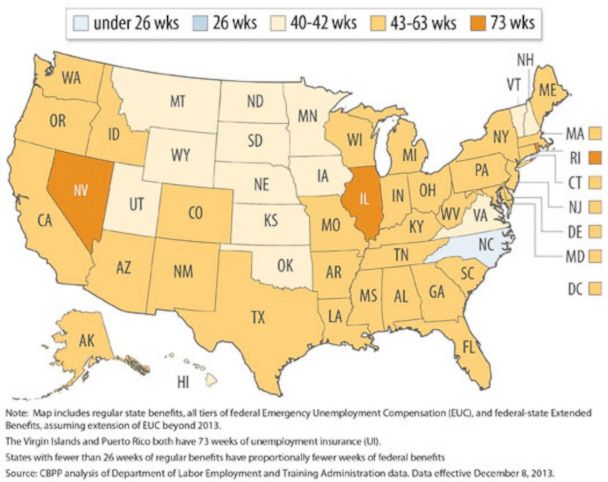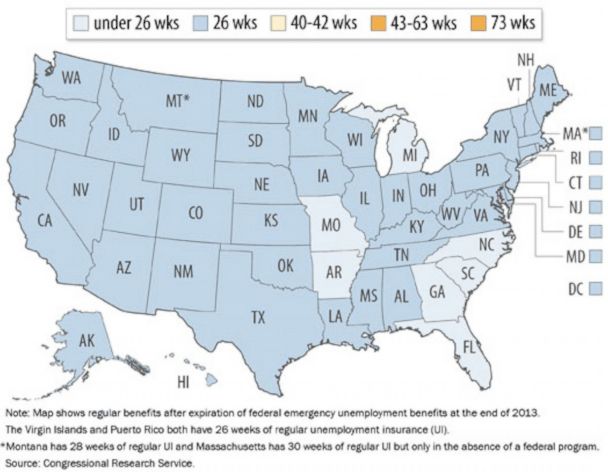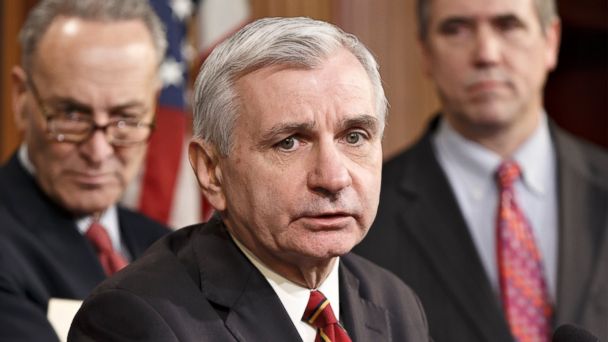Long-Term Jobless Benefits Clear Hurdle in Senate With GOP Help
Overcoming GOP opposition, the Senate today cleared the way for a vote on extending long-term unemployment benefits for three months, but still must wrestle over a way to fund the measure.
Democrats and Republicans will now negotiate over a final bill and what amendments to offer, with an eye toward how to pay for it. Another vote, again requiring 60 votes, barring an agreement between party leaders, could come later this week or next.
Six Republican senators - Kelly Ayotte, N.H.; Dan Coats, Ind.; Susan Collins, Maine; Dean Heller, Nev.; Lisa Murkowski, Alaska; and Rob Portman, Ohio - broke away from Republican leaders who opposed the $6 billion bill on the grounds that it adds to the deficit without offsetting cuts or government fees. The final vote was 60-37, in favor of advancing toward up to 30 hours of debate on the bill.
Heller, whose state has seen some of the nation's worst unemployment rates since the burst of the housing bubble, cosponsored the bill with Rhode Island Democratic Sen. Jack Reed.
READ: The Pull and Push Of The Unemployment Debate
President Obama lauded the Senate's vote and urged both chambers of Congress to quickly pass the measure to extend unemployment benefits.
"The good news is this morning the Senate took a very important step in that direction," the president said at an event with unemployed workers who have received such benefits at the White House today. "We've got to get this across the finish line without obstruction or delay, and we need the House of Representatives to be able to vote for it as well.
"Voting for unemployment insurance helps people and creates jobs, and voting against it does not," he added.
WATCH: White House Encourages Congress to Extend Unemployment Benefits
The president disputed the argument that extending benefits for the unemployed "saps their motivation to get a new job."
"That really sells the American people short," Obama said. "I can't name a time where I met an American who would rather have an unemployment check than the pride of having a job."
In an interview with ABC News' "This Week" Sunday, Sen. Rand Paul, R-Ky., made that case, telling George Stephanopoulos, "I'm not against having unemployment insurance. I do think, though, that the longer you have it, that it provides some disincentive to work."
On Dec. 28, about 1.3 million Americans lost eligibility for long-term unemployment benefits, a federal program that began in 2008 under President George W. Bush and continued through the recession and its aftermath. For those unemployed through no fault of their own, the difference amounts to 47 weeks of unemployment checks.
In most states, unemployed Americans can receive 26 weeks of benefits under state programs, but the recently expired federal program has added 47 more weeks of eligibility. In Illinois and Nevada, that has meant 73 weeks of total eligibility; in most other states, it has meant between 20 and 63 weeks, according to the Center on Budget and Policy Priorities (CBPP).
When the program expired Dec. 28, eligibility for benefits dropped back down to 26 weeks without the added federal funding.
About 72,000 Americans will lose benefits each week in the first half of 2014 without an extension, according to Democrats on the House Ways and Means Committee who cited Labor Department statistics.
Here's a Center on Budget Policy Priorities map of maximum eligibility by state, before benefits expired:

Maximum eligibility for benefits by state, if the federal benefits program were to resume. (Image Credit: Center on Budget and Policy Priorities)
Here's a CBPP map of maximum eligibility by state as it stands now, after federal unemployment-insurance benefits expired Dec. 28:

Maximum eligibility by state, after federal unemployment-insurance benefits expired Dec. 28. (Image Credit: Center on Budget and Policy Priorities)
Unemployment benefits, and whether to pay for them, have been a recurring battle in the Senate during Obama's time in office, with multiple partisan stalemates on whether to continue the program without spending offsets. Sen. Chuck Schumer, D-N.Y., said today's vote foreshadows more bipartisan cooperation and a move away from issues that have divided lawmakers for the past five years.
"The tectonic plates in our politics are moving. The issues that dominated the first five years of the president's term - the deficit above all and 'Obamacare' are becoming less important than helping the average American family get by as job growth isn't as robust as we'd like it and as middle-class incomes this decade have declined for the first time in American history," Schumer said at a news conference after the vote.
Before the vote, Senate Minority Leader Mitch McConnell, R-Ky., sought to tie the bill to a familiar political issue: Obamacare.
While Republicans haven't offered a specific set of offsets, McConnell suggested paying for the bill by delaying the Affordable Care Act's individual mandate by one year, a move the Congressional Budget Office has said would reduce the deficit by $35 billion.
"Let's find a way to pay for these UI benefits so we're not adding to an already unsustainable debt," McConnell said, asserting that there is "literally no excuse" for extending benefits without offsets.
Senators will now proceed to hash that out. Schumer suggested taxes on companies that move production overseas, while warning against a "Mexican standoff" over traditionally divisive offset proposals offered in past debates by Republicans and Democrats.
Another proposal, offered up by GOP Sens. Tom Coburn, Okla., and Jeff Flake, Ariz., along with Democratic caucus members Angus King of Maine, and Joe Manchin of West Virginia, calls for blocking long-term unemployment beneficiaries from also receiving Social Security disability benefits.
An extension faces a less promising future in the House, where Republicans have called for a slew of other economic policies besides extending unemployment benefits.
Before Obama's remarks at the White House today, House Speaker John Boehner, R-Ohio, called the president's appearance "a tacit admission on the part of the White House that the president hasn't done enough to help more Americans get back on their feet, and back to work," calling for approval of the Keystone XL pipeline and exemptions for some Americans from taxes related to his health care law.

(Photo Credit: J. Scott Applewhite/AP Photo)